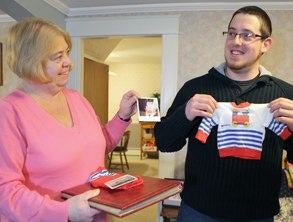 Tonight’s 9:30 broadcast follows major URI neuroscience news
Tonight’s 9:30 broadcast follows major URI neuroscience news
KINGSTON, R.I. – November 14, 2013 — University of Rhode Island nursing researchers are exploring brain and child development in novel ways and a new documentary, Baby Talk: Unlocking the Secrets of the Baby Brain, shows the lasting effects of their research. The documentary premieres tonight, Nov. 14, at 9:30 p.m. on WSBE Rhode Island PBS.
The premiere follows today’s announcement of the establishment of the George & Anne Ryan Institute of Neuroscience at URI through a $15 million gift by Tom and Cathy Ryan, the largest single private donation in University history. The gift was made in honor of Tom’s father, who died in 2004 from a stroke and resulting Alzheimer’s disease, and his mother, who died last year.
The documentary is the first in a new collaboration between URI and WSBE Rhode Island PBS, which will showcase quarterly half-hour prime-time features to bring public attention to the cutting edge research projects and scientific advances at the University. The series is co-produced by URI’s New Media, Department of Marketing and Communications, and Rosewood Productions.
Interim Dean of the College of Nursing Mary Sullivan and URI Clinical Nursing Professor Emerita Judith Mercer have spent much of their professional lives at Women & Infants Hospital, where their research began. The hospital is home to the state’s only neonatal intensive care unit, where premature babies, some as tiny as the palm of an adult hand, lie in incubators linked to monitors and life-saving equipment. The care is extraordinary, the devotion unceasing, but so is the worry about the next minute, the next month, and the decades ahead for the children and their parents.
For more than two decades, Sullivan has overseen this country’s longest-running study of premature infants. Brown University launched the study a quarter century ago, but Margaret McGrath, URI nursing professor emerita, took it over in 1989, and Sullivan joined the research team in 1990. Sullivan and her project manager of 17 years, Suzy Winchester, have watched their fragile subjects grow into healthy adults. The team has been awarded $7 million in funding from the National Institutes of Health’s National Institute of Nursing Research.
Sullivan’s findings show how supportive, loving parents, nurturing school environments, and stimulating factors work to offset delays pre-term infants experience in their physical, academic, and social development.
The documentary also focuses on Mercer’s research, which has confirmed that delaying the clamping of umbilical cords of pre-term babies produces dramatic health benefits. Now, together with Assistant URI Nursing Professor Debra Erickson-Owens, she is in the midst of another study of whether that simple delay benefits full-term babies.
For this new research, she and Erickson-Owens have teamed with Women & Infants Hospital and Brown University’s Sean Deoni, director of the Advanced Baby Imaging Lab, to study delayed clamping in full-term babies. The National Institutes of Health has awarded the team a five-year, $2.4 million grant to study 128 infants from birth to 24 months to measure the effects of delaying cord clamping on the structure and functioning of the developing brain. Called the Infant Brain Study, it also received a $100,000 grant from the Bill & Melinda Gates Foundation.
The team wants to determine if delaying the clamping of the umbilical cord, which allows the placenta to transfer iron-rich blood to the newborn, reduces iron deficiency and anemia in the first year for full-term newborns. The MRI scan results can also determine whether delayed clamping enhances myelination in the brain. Iron is required for the process of forming myelin sheaths around nerves in the brain. Good myelin sheaths allow impulses to move more quickly and are critical to a healthy nervous system.
Shown above: “I am proud to know that my University is doing this kind of work.” —Catherine Foster ’74, M.A. ’87, shown left with her son Sean, reminiscing about his preemie days. URI Photo by Michael Salerno Photography.

